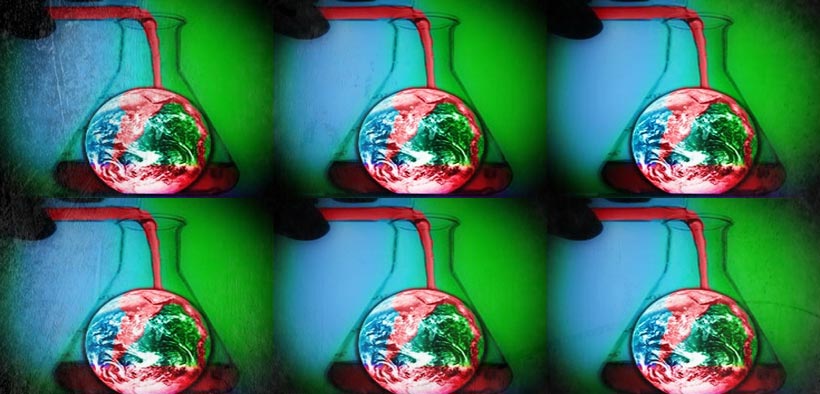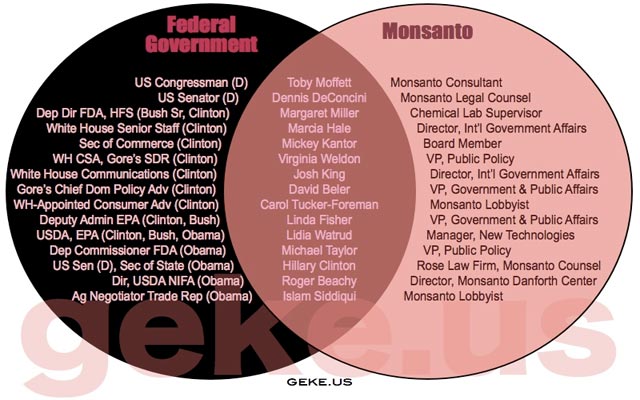Is Genetic Modification Modifying Us?

It’s a question worth asking.
Food turned science experiments known as genetically modified organisms have been linked in independent scientific studies to everything from giant tumors to infertility. Big Agra companies like Monsanto (the biotech giant who lovingly brought us DDT and Agent Orange, and which raked in $13.5 billion in profits last year alone) have genetically modified corn crops, for example, to produce their own pesticide.
Nature took approximately millions of years to create our world the organic way. What gives any human — scientist or super hero — the idea he or she can come along with a chemistry set and a few college degrees and do so much better?
Pesticides are already sprayed all over conventionally grown items as it is, but when we eat pesticide-producing corn, we are ingesting the pesticide it makes as well.
Why that’s no big deal to some people still stupefies me. Because there are no labeling laws, there is truly no way to know if what we are eating has been bioengineered. Case in point: some estimate there may be upwards of 30,000 GMO products sitting on grocery store shelves right now.
Unfortunately, the big four: corn, soy, cottonseed and canola are by far not the only GMOs currently making their way to our dinner tables.
Did you know that fruit giant Dole is currently in the process of testing genetically modified pineapple? On April 26th, the company announced that the U.S. Department of Agriculture approved testing back in January of the frankenfruit dubbed Rosé for its rose-colored flesh.
One new strand of genetically modified wheat is meant to turn off undesirable genes (though GMO promoters often have their own problem with switching ON harmful genes unexpectedly). The Centre for Integrated Research in Biosafety has released a report stating the frightening potential of this new wheat:
“Through ingestion, these molecules can enter human beings and potentially silence our genes.”
This potential is nothing to scoff at; it could potentially end in potential death. It only makes sense that ingesting something unnatural would have an unnatural effect on us.
Modified plants aren’t the only living things winding up on the lab table, either.
Genetically modified salmon may be the first animal approved for human consumption if the U.S. Food and Drug Administration (FDA) gives a company called Aquabounty Technologies its way. This giant mutant fish has been promoted as super cool and trendy, despite warnings from independent scientists that these aggressive GMO varieties could wipe out natural salmon in just 40 generations:
By the way, here are 15 reasons not to trust the FDA:

In other news, in the tradition of designer GMO pet fish, scientists can’t seem to stop making things glow in the dark; the first genetically modified glow-in-the-dark sheep were born in Uruguay this week as well:
Hey, let’s just toss a little extra DNA into everything else while we are at it! Why not? A professor at Roslin Institute and genetically modified animal expert Helen Sang told Gulf News, “This a very exciting time. We have GM animals that have qualities you can’t achieve through conventional animal breeding.”
Exactly! That’s the whole point, Helen! You can’t have them because they don’t naturally exist!
Time is relative, but from what we know based on our best dating methods, nature took approximately millions of years to create our world the organic way. What gives any human, scientist or super hero, the idea he or she can come along with a chemistry set and a few college degrees and do so much better?
Besides, let’s be straight, scientists aren’t dreaming these things up and cranking them out simply because they are really neat-o or even under the philanthropic guise of saving the world from hunger (otherwise known in some places as artificial food shortages). Ultimately the companies behind GMOs create them because they have a vested interest in generating revenue.
”Monsanto should not have to vouchsafe the safety of biotech food. Our interest is in selling as much of it as possible. Assuring its safety is the F.D.A.’s job.” — Phil Angell, Monsanto’s then director of corporate communications
GMO isn’t about making the world a better place because it doesn’t even take long-term effects on the world into account! GMO is all about making money. That’s the bottom line, plain and simple. These foods have only been widespread in our food supply since the late-1990s. The long-term effects on our health, plants, animals, and our environment have yet to truly be seen.
What is all this GMO doing to us? To our kids? To their kids? To their grandkids?
We don’t even really know yet.
Animal studies that have been done suggest staggering genetically modified dangers that we have to sit up and take seriously. Jeffrey M. Smith, of the Institute for Responsibility Technology, has logged some 65 known issues with genetically modified foods, including animal research that has demonstrated widespread fertility and reproduction issues, organ and intestinal damage, auto-immune triggers, cancer and more.
Now professors are publicly warning the world that we may dehumanize ourselves with designer genetically modified eugenic babies. Are we so desensitized to GMO we’re willing to birth GMO babies? What are the implications of that and where do they ever end?
While GMOs continually threaten us and our natural, organic food, President Obama continues to stand by Big Agra. First he appointed former Monsanto lobbyist Michael Taylor as our Food Safety Czar, a sentence that sounds more like the punchline to a bad joke than reality. Most recently, Obama signed a bill with a nice little rider tucked in it to protect biotech companies from federal court proceedings even if environmental studies are incomplete. The so-called Monsanto Protection Act completely ignores the potential risks that genetically modified food poses to, well, everything.
Really makes me want to run out right now and buy his wife’s organic gardening book.














